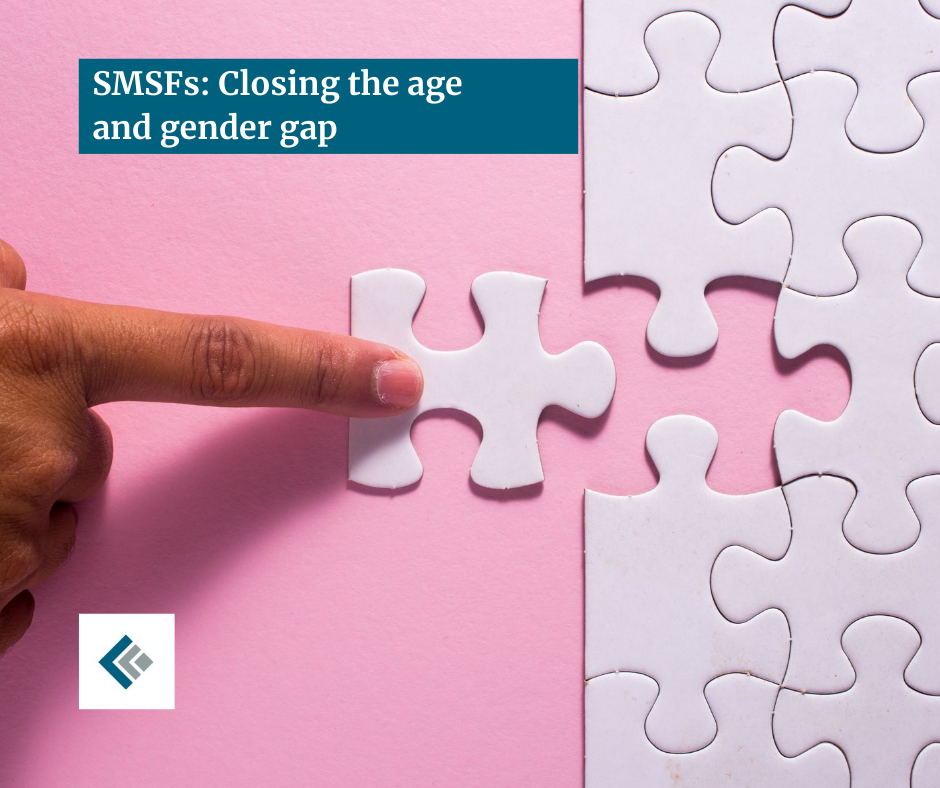
What are the arguments for and against having your own Self Managed Super Fund (SMSF)? We discuss in our latest post.

What are the arguments for and against having your own Self Managed Super Fund (SMSF)? We discuss in our latest post.

A recent ATO report showed Australians under the age of 45 now make up around 47% of all new SMSF trustees. So what’s driving younger people to SMSFs?

Most older Australians are not mapping out plans to pay for their aged care, a survey shows…

With careful planning, you can give a helping hand to your adult children financially, while still enjoying a comfortable retirement.
In the past, wealth was often passed on through inheritance. But with our longer lifespans, and the higher cost of living (especially housing), the desire to help our kids while we’re alive and well is increasing.
If your children are young, you may have twenty or thirty years to save and invest on their behalf, while also saving for your own retirement. If this is the case, it pays to put a strategy in place early on.
For those nearing retirement age, or already retired, you may have a large lump sum you’d like to gift to one or more of your kids. Giving money is a wonderful thing to do, but it’s not always simple. It can have tax implications and may affect your income support payments from Centrelink. On the other hand, gifting may enable you to increase your government pension payments or benefits, if done right.
So how can you help your children without compromising your own financial security and comfort in retirement?
Ensure you’re on track for a comfortable retirement.
Before you give away your wealth, it’s important to remember that you need to fund your own retirement for many years.
Australians are living longer than ever, with more years spent in retirement. If you were to retire at age 60 and live to 90, that’s one whole third of your life spent in retirement.
As well as wanting to enjoy your retirement through travel or leisure activities, older age often comes with more medical and health expenses.
So it’s really important to make sure you have enough funds saved and invested to get you through. This might sound selfish, but in reality, it means you won’t become a financial burden on your children later in life.
How much will you need to retire, and, how much can you afford to give away now? It’s always best to seek professional financial advice to ensure you have enough put away to see you through. A financial planner will be able to give you tailored advice about the impact of your giving on your retirement plans.
Related: Super 101 – Your guide to a happy retirement
What am I giving money for?
Next, consider what it is you’d like to help your son or daughter with. Are the funds for a property deposit? To pay for a wedding. Education expenses? This might offer some clue as to the right amount of support.
Following on from this, consider how many children you need to help. If you gift funds to one child, do you need to match that for others when the time comes? If you have several children, but some are doing better than others, do you need to help them all equally?
Balancing the family dynamics around money is important, as it can be a sensitive issue. The last thing you want to do is cause a rift in the family over some perceived inequality. If you do have several children you need to help, keep this in mind, as it will limit how much help you can offer each child.
Giving an incentive
Often the best way to support children financially is to match their own contribution. Rather than purchasing something outright, offer to base your assistance on their own savings. This also means they have a vested interest in the item, which means they’re likely to treat it more carefully.
Related: How to help your children with buying property
How should I give money?
If you receive the Age Pension or other benefits from Centrelink, there is a limit to how much you can give away. The gifting rules allow you to give $10,000 over one financial year, or $30,000 over five years. You’ll need to let Centrelink know when you’re planning to give a gift of this type.
If you’re considering giving your children a substantial amount of money, it’s worth taking the advice of Dr Brett Davies at Legal Consolidated. He recommends always giving funds as a loan ‘payable on demand’, not as a gift. Creating a written loan agreement helps keep the money in your family, even if things don’t go to plan.
As Dr Davies explains, a correctly worded and executed loan agreement can protect the money in case your child was to:
He gives this as an example. You gift your daughter $400,000 to buy a house. Five years later, she divorces her husband and the house is the only asset of the marriage. The Family Court awards half of the value of the house to the husband, including $200,000 of your donated funds.
If you instead had a valid loan agreement in place, the loan must be paid out before the assets are distributed. Hence, the $400,000 comes back to you, to do with as you please. You can read more examples of a loan agreement in action here.
Always seek professional legal advice when drawing up a loan agreement to ensure that it’s compliant with the law, properly worded and correctly executed.
Get professional advice.
If you’re nearing retirement and looking to give up work, downsize your home and/or gift funds to your children, it’s important to seek financial advice.
Reach out to the Sherlock Wealth team here so we can help you work out a strategy for meeting multiple goals, such as giving to several children while funding your own comfortable retirement.
Source: Money and Life
(Financial Planning Association of Australia)

Halving of pension minimums for FY2022
On the 29th of May, the federal government announced an extension of the temporary reduction in superannuation minimum drawdown rates for a further year to 30 June 2022.
|
Age |
Reduced percentage factor for 2019/20, 2020/21 and 2021/22 | Normal percentage factor |
|
Under 65 |
2% |
4% |
|
65–74 |
2.50% | 5% |
|
75–79 |
3% |
6% |
|
80–84 |
3.50% |
7% |
|
85–89 |
4.50% |
9% |
| 90–94 | 5.50% |
11% |
| 95 or more | 7% |
14% |
The government says their aim is to make life easier for retirees by giving them more flexibility and choice in their retirement. This extension builds on the additional flexibility announced in the 2021-22 Budget.
There is no action that needs to be taken until the new financial year.
For existing clients, we will be reaching out to those of you affected by this change. In the meantime, if you wish to discuss please do not hesitate to contact us.

How much do you need to save to make sure you have enough to last throughout retirement? It very much depends on what your living costs will be after leaving work. Find out more about how to budget for the retirement income you’ll need for the lifestyle you’re planning for.
When you plan to retire will often be determined by whether you can afford to stop working and still have enough income to maintain your lifestyle. Figures from the Australian Bureau of Statistics[1] show the majority of men (36%) and women (22%) chose to retire at the time when they became eligible to draw on their superannuation and/or the age pension. And their average age at retirement was 63.5 years.
If you’re planning to delay retirement until your super balance reaches an amount you can comfortably live on, just how do you determine what that target should be? There are a number of factors that will affect how far your money will go, including your life expectancy, how your money is invested and other choices you make for managing your income. But one of the most important steps to planning for a secure financial future in retirement is to be realistic about your living costs.
How your living costs might change
As you stop working and have more time to yourself, your routine will change and you might save on some costs as a result. Spending on transport could fall as you no longer have to commute. If buying lunch and takeaway coffees have been a daily habit while working, you could also make significant savings by leaving these out of your retirement routine. Other living expenses, such as buying groceries and clothes and paying household bills are likely to be much the same before and after retirement.
Thinking about how you’ll spend time in retirement and where you’re planning to live will also give you clues about how your spending might go up or down. If a few trips overseas are on the cards, you’ll need to allow for these occasional costs in your overall budget. But if you’re planning to limit travel to domestic holidays only, then you won’t need to allow for these expenses in your financial plan.
Start with a ballpark estimate
How much travel you plan to be doing is just one of the many daily and one-off costs taken into account in the Retirement Standard estimates for annual expenses. Updated every quarter by the Association of Superannuation Funds of Australia (ASFA), these figures can give you a rough idea of what you can expect to be spending day-to-day in retirement.
There are two estimates available, a higher one for a comfortable lifestyle and a lower amount for a modest lifestyle. As at December 2018, the amount you’d spend as a single person aged around 65 years enjoying a comfortable lifestyle is $43,317 and for a modest lifestyle, the annual budget is $27,648. The estimate for couples is $60,977 and $39,775 for comfortable and modest lifestyles respectively.
To give you an idea of how differences between a modest and comfortable budget might impact on your retirement plans, the annual travel budget is a good place to start. A couple living modestly can expect to spend approximately $2,500, with no allowance for overseas trips. On a comfortable budget, a couple can splash out more than $5,000 each year on travel, with roughly a third going towards international travel.
The cost of lifestyle changes
Although it’s wise to build a budget based on what you expect to be doing in early retirement, your overall plan should also take into account the potential for lifestyle changes as you age. Travelling for longer periods, dining out and entertainment and taking part in sports and hobbies could taper off as you grow older. Health and aged care costs, on the other hand, could make up a larger share of your budget in the later years of retirement.
A plan to see you through retirement
Your expenses are just one side of the whole budget planning process. Taking a good look at all your retirement income options is just as important to figure out how much you’ll need and when you’ll be ready to take that step. From the age pension to the equity in your home to retirement income products such as annuities and account-based pensions, there are all sorts of ways to support yourself financially towards having the lifestyle you want.
The Sherlock Wealth Team can support you in exploring these opportunities to manage your income for your whole retirement so you can make better choices for a secure financial future. Reach out to the Sherlock Wealth team to discuss your unique situation here
Source: Money and Life
(Financial Planning Association of Australia)

Finding the right level of insurance cover is important when you’re thinking about retirement.
If retirement’s coming up on your horizon, the impact of COVID-19 (Coronavirus) may have thrown a warehouse-sized rack of spanners in your planning.
It makes sense to concentrate on things you can control, such as insurance. Too-high premiums can chew away at the foundations of your savings, at a time when they’re more important than ever. Under-insure and one day your floor may collapse, undone by events you can’t foresee.
Cover for a changing life
A good way to get started is to think about what you really need, and what you don’t. As you get close to retirement, you may want to make sure you’re holding the right insurance for the lifestyle you want.
Here’s a simple checklist that may help:
Many of us take out insurance and are done with it – it’s enough to know we have the proverbial rainy day covered off. However, with economic clouds gathering, now’s a good time to review what you’ve already got and assess if it’s still right for you and your needs.
So, dig out your existing insurance agreements, taking special note of when they’re due to expire and your continued eligibility for the policies they hold.
An important area for many Australians is insurance held inside superannuation.
Insurance inside super
Insurance inside super can help us out when we really need it. Like any type of insurance, it works best when you’ve got the right level of protection for your situation. As you head towards retirement and your life changes, so might your priorities.
As well as life insurance, you might have total and permanent disablement (TPD) inside super. TPD cover may provide you with a lump-sum payment if you suffer a disability that prevents you from ever working again.
TPD could help you pay for ongoing medical expenses, alterations to your home to make day-to-day life easier and help provide future financial stability.
Total salary continuance, also known as income protection, is designed to pay a monthly benefit of up to 75% of your pre-disability regular income if you’re unable to work due to injury or illness.
Typically, within super, income protection provides you with cover either for a two-year or five-year period or until you turn 65, depending on the terms in your employer plan.
What to look out for
There are pros and cons of insurance within super. Things to think about if you’re approaching retirement include:
Don’t double up and stay flexible
As part of your review, it’s also a good idea to check insurance you hold inside super against other policies you might have outside super.
Then compare your cover, check whether you have any insurance double ups – if you have more than one super account with the same type of insurance, you may be paying for more insurance than you need.
As well as comparing the level of cover you get, consider any exclusions, such as the treatment of any pre-existing medical conditions, and waiting periods. Remember that if you do cancel your insurance, you might lose access to features and benefits and may not be able to sign back up at the same rate.
It’s also important to disclose your situation to your insurer honestly. Otherwise, the insurer may be entitled to refuse your claim.
Tricky times call for flexible thinking. Volatility can be daunting, whatever age you are. Fortunately, you’ve got the life experience to look beyond the headlines and adapt to changing circumstances. Reviewing your insurance is as good as any place to start.
Source: AMP